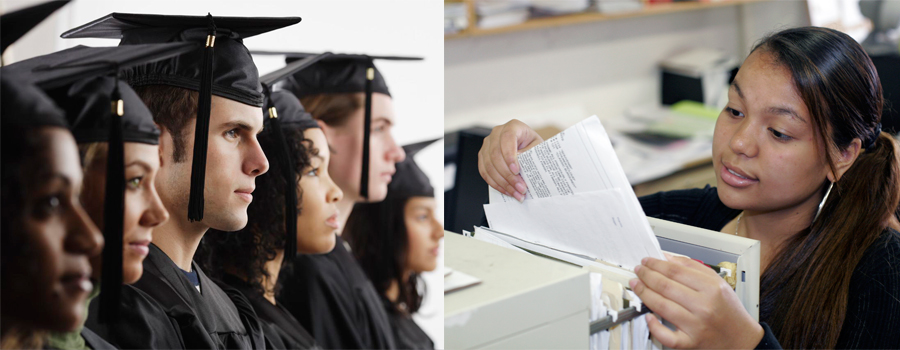Coming of age in a struggling economy
October 31 , 2012
by Izabella Robinson, 14, and Hannah Zimet, 18
INDIANAPOLIS, IN—The downturn in the economy has caused much tension among adults, but they’re not the only ones who are feeling the effects of the recession. Youth of all ages are frightened to see a potentially catastrophic future for themselves—one filled with debt, unemployment, and deprivation.
 Earlier this year, Y-Press surveyed 400 youth across the country about their priorities for the country and their views on the upcoming presidential election. When asked about the top issue for their generation, a majority responded: the economy.
One of those respondents was Cody Philips, 18, from Bexley, Ohio. “It’s obvious to say the economy. Look at our national debt. We are running a deficit that will blow the United States into the abyss,” he said.
Earlier this year, Y-Press surveyed 400 youth across the country about their priorities for the country and their views on the upcoming presidential election. When asked about the top issue for their generation, a majority responded: the economy.
One of those respondents was Cody Philips, 18, from Bexley, Ohio. “It’s obvious to say the economy. Look at our national debt. We are running a deficit that will blow the United States into the abyss,” he said.
Alex Johnson, 16, Indianapolis, concurred: “I’m worried about where we’re headed in terms of money. Our country keeps asking for money and I’m worried about how we are going to pay it back.”
But overall, the apprehensions about the economy are personal. The downturn has taken its toll on families, and its effects do not go unnoticed by the children.
Philips definitely has personal reasons to be worried about the economy. He has Crohn’s disease, and obtaining treatment for his condition was difficult when his family went through some hard times during the recession.
“Before Obamacare, I would not have been able to get health insurance. If I had a Crohn’s flare-up, which means I would’ve had to have gone to a hospital, that would’ve cost nearly four grand. That’s just not something that can be affordable, even for someone who has a job.”
Affording college
Another very personal concern for youth is affording college, as the cost of higher education continues to rise. Uchechi Iteogu, 19, receives financial aid at Columbia University in New York, but some of her friends fromher hometown of Macon, Ga., have not been so lucky.
“I have a friend. Both of his parents lost their jobs a week after he moved. It has affected him incredibly. He had to leave college because he couldn’t pay for the loans and now he’s having to work three jobs just to pay off his loans so he can get a transcript so he can apply to another college that’s cheaper,” she said.
College costs also trouble Eddie Williams, 18, an Indianapolis high school senior. He would like to pursue a science major at an Ivy League school, but he may have to scale back his goals. “I definitely am a little concerned about being able to afford college. My parents are self-employed, so I'm not sure how much they'll be able to contribute without wrecking their retirement fund.”
Williams is disgusted about the state of higher education today. “We have a culture that values learning for the sake of learning but punishes it financially if you get a degree that doesn't apply to a job immediately.”
Brynna Foreman, 17, also is an Indianapolis senior sending out college applications. She’s looking at liberal arts schools and has tried to be pro-active when it comes to paying for college. “I’m worried about being able to afford college, but I'm already saving and investing so I think that eventually I'll be OK on my own. It worries me a lot, but I know that being broke isn't the end of the world,” she said.
Finding a job
But Brynna has other concerns. “Finding a job after college worries me a lot. I know that I can get a job lifeguarding, but that's not really a career path.”
 She is not alone. Worries about future jobs is another top concern of youth today. According to a recent analysis by the Associated Press, about 1.5 million, or 53.6 percent, of bachelor's degree-holders under the age of 25 were jobless or underemployed in 2011.
She is not alone. Worries about future jobs is another top concern of youth today. According to a recent analysis by the Associated Press, about 1.5 million, or 53.6 percent, of bachelor's degree-holders under the age of 25 were jobless or underemployed in 2011.
Continued high levels of unemployment among college graduates not only raise fears of future loan defaults but temper dreams of a prosperous future.
Iteogu understands the struggle of a job hunt, both present and future. She told of looking for a job during her spring break. “It took months and months,” she said.
And she doesn’t expect the future to be any easier. As a pre-med student, she knows she has years of training before she becomes a physician. Based on what she has heard from others in the medical field, she does not expect a guaranteed high income. “I think in comparison to how it’s been in the past, it will be hard. The medical field is not what it used to be. And you do hear a lot of doctors talk about how health care reform is actually not going to be beneficial to them personally,” she said.
But she is OK with that, if it means better care for Americans.
“Though it may be harder for me to find a position in a practice down the road, I think that as doctors we have to understand that when we take the Hippocratic oath—so that we help not harm—the whole point of that is that we need to make sacrifices for the well-being of our patients. And so it’s imperative that we support everyone’s entitlement to proper health care,” she said.
This dedication and resolve is shared by many other students coming of age in a struggling economy. They know the world does not revolve around them, and they are willing to work for a better future for themselves and for the country.
Says Philips: “I’ve been growing up in this hugely polarized country, you know, complete gridlock in terms of politics and in terms of Congress and the executive branch. That has created a need for kids to look at their parents and say, ‘Well, how can we be better?’ How can we make America the country that they had when they were growing up?”
To get a youth perspective on the 2012 Presidential Elections, WKCD has teamed up with the youth-led news bureau, Y-Press, based in Indianapolis. Originally part of the Children’s Express, Y-Press has nurtured young journalists for more than 20 years. Their stories and articles—on local, national, and global topics—appear every other week in the Indianapolis Star. The Y-Press web site is updated regularly and encourages external submissions and comments about youth-written stories and reviews.
Here, Y-Press reporters will be posting: stories about the campaign, the candidates, and youth perspectives on the political process profiles and interviews with young political activists results from surveys they’ve created to gather information from youth nationwide about the candidates and the issues most important to young people reports from the floor at both of this summer’s national conventions. Check back often to keep up with this special “youth beat” on Election 2012.





